The SSD Anthology: Understanding SSDs and New Drives from OCZ
by Anand Lal Shimpi on March 18, 2009 12:00 AM EST- Posted in
- Storage
PCMark Vantage
Next up is PCMark Vantage, another system-wide performance suite. For those of you who aren’t familiar with PCMark Vantage, it ends up being the most real-world-like hard drive test I can come up with. It runs things like application launches, file searches, web browsing, contacts searching, video playback, photo editing and other completely mundane but real-world tasks. I’ve described the benchmark in great detail before but if you’d like to read up on what it does in particular, take a look at Futuremark’s whitepaper on the benchmark; it’s not perfect, but it’s good enough to be a member of a comprehensive storage benchmark suite. Any performance impacts here would most likely be reflected in the real world.
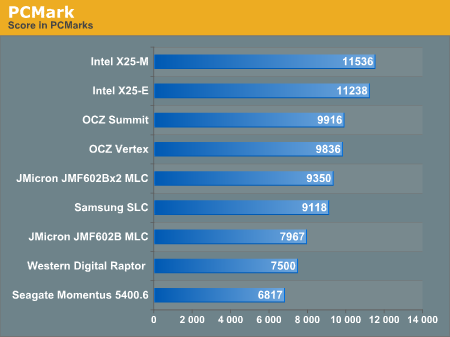
If you've paid attention to the synthetic tests from the previous pages, the results here should make sense. The Intel drives take the top two spots followed by the two OCZ drives, then the JMicron and conventional HDDs take up the rear.
While PCMark does do a great job of measuring disk performance, it doesn't seem to stress random write performance as much, allowing the JMicron drives to relax a bit.
Now let's look at the individual test suites:
The memories suite includes a test involving importing pictures into Windows Photo Gallery and editing them, a fairly benign task that easily falls into the category of being very influenced by disk performance.
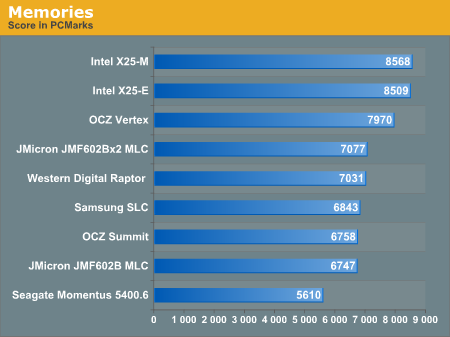
The TV and Movies tests focus on on video transcoding which is mostly CPU bound, but one of the tests involves Windows Media Center which tends to be disk bound.
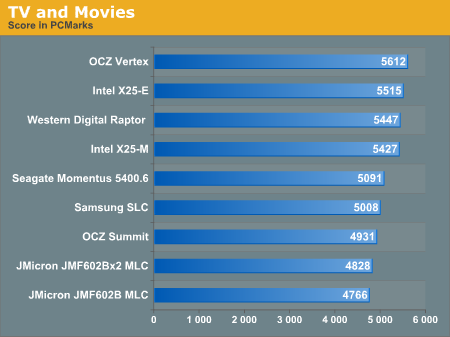
SSDs won't always dominate and in many cases they won't offer tangible improvements over a fast hard drive.
The gaming tests are very well suited to SSDs since they spend a good portion of their time focusing on reading textures and loading level data. All of the SSDs dominate here, but as you'll see later on in my gaming tests the benefits of an SSD really vary depending on the game. Take these results as a best case scenario of what can happen, not the norm.
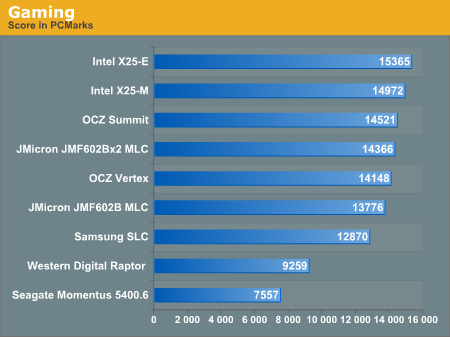
In the Music suite the main test is a multitasking scenario: the test simulates surfing the web in IE7, transcoding an audio file and adding music to Windows Media Player (the most disk intensive portion of the test).
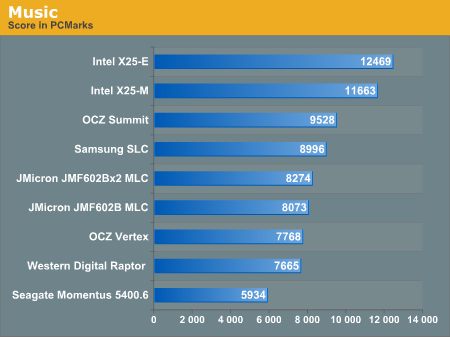
The Communications suite is made up of two tests, both involving light multitasking. The first test simulates data encryption/decryption while running message rules in Windows Mail. The second test simulates web surfing (including opening/closing tabs) in IE7, data decryption and running Windows Defender.

I love PCMark's Productivity test; in this test there are four tasks going on at once, searching through Windows contacts, searching through Windows Mail, browsing multiple webpages in IE7 and loading applications. This is as real world of a scenario as you get and it happens to be representative of one of the most frustrating HDD usage models - trying to do multiple things at once. There's nothing more annoying than trying to launch a simple application while you're doing other things in the background and have the load take seemingly forever.
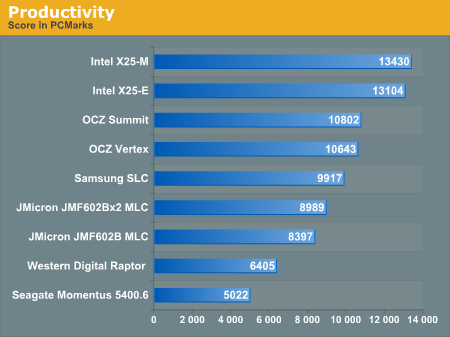
The results here are the best characterization of my personal experience with the drives. The Intel drives are the fastest, a good 25% faster than the Summit or Vertex. Next up are the OCZ drives, with the Vertex dangerously close to the Summit. The older Samsung SLC is next in the standings, followed by the JMicron drives. There's a healthy combination of reads and writes going on here which benefits all of the SSDs, including the less desirable ones.
The final PCMark Vantage suite is HDD specific and this is where you'll see the biggest differences between the drives:
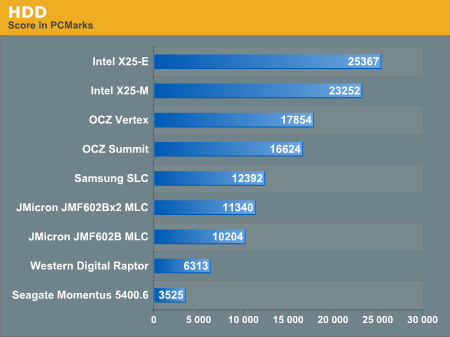
Again we're seeing the sort of breakdown we'd expect. The Intel drives come out ahead, while the Vertex is the best bang for your buck.










250 Comments
View All Comments
blackburried - Wednesday, March 25, 2009 - link
It's referred to as "discard" in the kernel functions.It works very well w/ SSD's that support TRIM, like fusion-io's drives.
Iger - Wednesday, March 25, 2009 - link
This is the best review I've read in a very long time.Thank you very much!
BailoutBenny - Tuesday, March 24, 2009 - link
Great in depth article on flash based SSDs. I'm waiting for PRAM though.orclordrh - Tuesday, March 24, 2009 - link
Very illuminating article, very well written and researched. It made me glad that I didn't pull the trigger on an SSD for my I7 machine and regret not buying OCZ memory! I'm interested in adding an SSD as the scratch disk for Photoshop CS4 to use. I don't really launch applications very often, say once a week on the weekly reboot and keep 6-8 apps open at all times. I have 12GB of memory for that. The benchmarks were very interesting, but what sort of activity does Photoshop scratch usage create? Large files or random writes? What type of SSD would be most cost effective here?An SSD does sound better than a SSD!
semo - Wednesday, March 25, 2009 - link
wait for ddr3 to enter the mainstream and buy loads of memory.use a ramdisk for your adobe scratch area. much faster than ssd and no wear to worry about (not that you would worry that much with modern ssds anyway).
http://www.ghacks.net/2007/12/14/use-a-ramdisk-to-...">http://www.ghacks.net/2007/12/14/use-a-ramdisk-to-...
there is also a paid for and more feature rich ramdisk out there. can't remember the name
strikeback03 - Wednesday, March 25, 2009 - link
I'll have to check when I get home, but I believe the recommended size for the scratch disk is upwards of 10GB. So would need a motherboard that supports a LOT of RAM to give enough to main memory plus a scratch disk.strikeback03 - Wednesday, March 25, 2009 - link
I was wondering the same thing. I'd guess it would be a lot of writing/erasing, so an SSD might not be the best from a longevity standpoint, but if your system is hitting the scratch disk often then the speed might make it worthwhile.mikepers - Tuesday, March 24, 2009 - link
Anand,I wanted to compliment you on what I think was an excellent article. This is the type of thing I really have always liked from Anandtech. The detailed background, the technical reasons for the issues and then a thorough review of the current state of things.
I just finished upgrading my desktop. The only remaining item I wanted to replace was the hard disk. I had been thinking about getting a Velociraptor but instead I just ordered a 60GB Vertex from Newegg.
Thanks again for all the work.
Mike P.
ameatypie - Monday, March 23, 2009 - link
That sure was a lot to take in! Fantastic article though, it has really opened my eyes to the possibilities that Solid State Drives provide. Probably wont be buying one in the immediate future given the so-called depression and such things, but i will certainly keep up with SSD progress.Thanks again for your fantastic articles - im sure im not the only one who really appreciates them :)
coopchennick - Monday, March 23, 2009 - link
Hey Anand, I just finished reading through this whole article and I'm very impressed with the thoroughness and how informative it was.You just acquired a new regular reader.